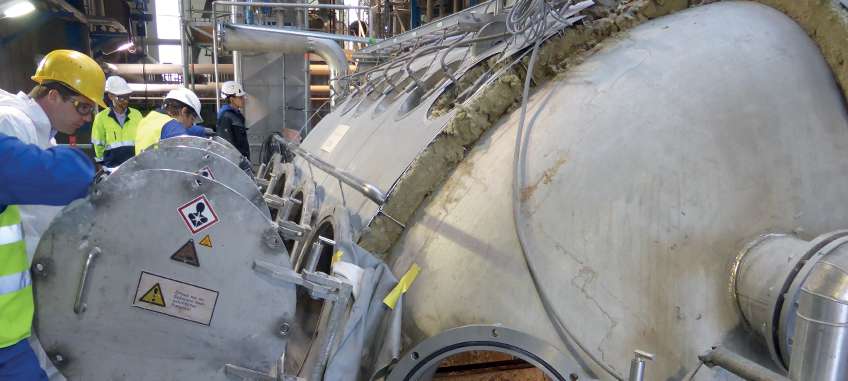Situation
The seal must protect employees, machinery and buildings from chemicals
Mechanical seal LP-D for a pressure disk filter

The seal must protect employees, machinery and buildings from chemicals
Enable simple assembly and disassembly, reduce maintenance requirements
Cartridge seal LP-D from EagleBurgmann

A typical pulp mill in Europe produces over 400,000 tons of pulp and 80,000 tons of paper per year. Smooth production of elemental chlorine-free bleached (ECF) long fiber sulfate pulp also relies to a great extent on the sealing technology used in the individual processes.
Seals in the liquor line perform the important task of protecting employees, machinery and the building from the chemicals that are recovered there for pulp production. EagleBurgmann convinced the persons responsible for the liquor line of a customer to equip the shaft of the pressure disk filter with the practical and reliable cartridge seal LP-D, thus reducing maintenance costs in the long term.
The pressure disk filter separates white liquor from lime slurry. The mechanical seal from EagleBurgmann is mounted on both the drive and non-drive sides of the shaft. It is double-acting, i.e. it reliably prevents the caustic and hot white liquor from reaching the atmosphere. Since the medium is injected on the drive side of the shaft, the seal on that side has more contact with the caustic white liquor. As there always is only one filter in the recovery island, a seal failure would always cause an unplanned shutdown of the complete pulp mill. Therefore reliability is the key criteria for the seal design.
The seal is specially adapted for use in filter machines of well-known manufacturers for the paper and pulp industry. The robust LP-D has various distinctive design features. For example, the dynamic O-ring is not located directly on the shaft, but within the seal. The design of the stationary seal face on the product side prevents deposits of white liquor in the groove of the O-ring which would block the compensating movements of the seal. Stationary springs on the product and atmosphere side counteract leakage by compensating shaft movements to keep the sealing gap consistently closed.
The wall thickness of the shrink fits is generously dimensioned to dissipate heat from the seal and prevent deformation of the sliding faces. Also, the seal faces are made of robust materials to prevent wear caused by the abrasive, hard particles of the lime slurry. The seal is supplied with pressurized buffer water for optimum supply and to prevent the medium from penetrating the seal.

The failure of one seal would inevitably lead to a standstill of the entire recovery unit. Understandably, the customer placed great value on a reliable seal and a simple assembly and disassembly process. Since the seal from EagleBurgmann is a cartridge design, work on the five-ton shaft can be completed relatively quickly.
To ensure convenient and reliable fixing of the seal during transport, assembly and disassembly, the assembly fixtures are made of robust material and are dimensioned accordingly. The shaft sleeve is so stable that it can withstand many assembly and disassembly processes.
The LP-D mechanical seal from EagleBurgmann has been used satisfactorily in the pulp mill on the drive and non-drive side of the shaft since 2010. The MTBR of three years exceeded the expectations of the operators and reduced the costs for the seal service to a minimum.
Operating conditions

From mechanical seals for economical and reliable non-flow operation to the use of new instruments for seal supply with simultaneous monitoring of the mechanical seals - EagleBurgmann has practical solutions: Depending on the application, various control units are used to regulate and optimize the water supply.
Pumps, agitators, chest agitators, pulp digesters, washers and sorters are sealed with mechanical seals of the LP, M7, Cartex, MG and HJ series. In addition, Buraflon-type stuffing box packings seal numerous machine shafts in the process.

Between June 2017 and March 2019 the Hengli Group constructed an integrated refining and chemical complex in the Chinese harbor town Dalian where 20 million tons of crude oil are processed every year. EagleBurgmann advised the company Hengli concerning the selection of mechanical seals and supply systems for the whole plant and supplied more than 95 % of the components in use.

In Great Britain, a shortage in natural gas supply has severe consequences: Since the country switched from coal-fired to gas-fired power stations, a gas supply shortage makes households and industrial consumers not only vulnerable to failing heating and gas stoves, but also to power outages. Companies along the value and transportation chain of natural gas are therefore especially dependent on reliable equipment.

Things get hot in rotary kilns, very hot in fact. In the production of cement, for example, the thermometer measures more than 1,000 degrees Celsius. Sealing systems from EagleBurgmann, a company of the Freudenberg Group and EKK, make sustainable contributions to environmental protection, energy efficiency and process reliability under these "fiery" high-temperature conditions.

Our modern civilization is quite literally built upon cement. Today, building materials made from cement are used in buildings, roads, bridges, dams etc. Cement production is a heat-intensive process and causes thermal expansion in duct systems. To compensate this, Indian cement producer Ramco Cement needed fabric expansion joints with a diameter of several meters for two of their plants. On the basis of a close collaboration, EagleBurgmann was able to design components that increase the efficiency of the plant in the long run.

Seals are a risk factor in the production of liquid crystals. If there is even the slightest contamination of the liquid crystals, this will later affect the image quality of the display. Read on to see which sealing solution Merck KGaA uses in paddle dryers for the production of liquid crystals.

Cruise liners have to reduce their sulfur emissions in Emission-Controlled Areas (ECAs). To accomplish this, light fuel oil is used in coastal regions - with significant consequences for the ship's fuel supply.